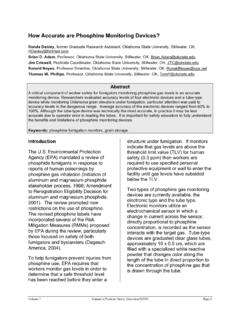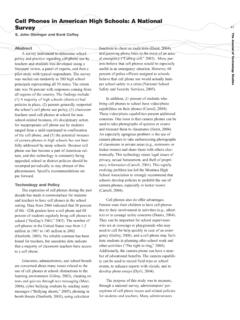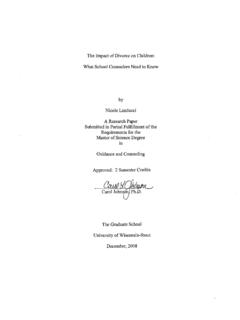Transcription of Growth and Exploration: Career Development Theory and
1 Career and Technical Education Research, 33(3), pp. 227-243. 2008. Growth and Exploration: Career Development Theory and Programs of Study Natalie R. Kosine University of Louisville Morgan V. Lewis Ohio State University, Retired Abstract Super's Theory of Career Development states that the life stages of Growth and exploration are inherent to the process of acquiring knowledge of how one's interests and abilities align with the requirements of occupations. Virtually all high school students are in the exploratory stage of their Career Development . This article examines the implications of this stage for the choices high school students must make concerning programs of study. Evidence relative to the Theory and effectiveness of interventions designed to facilitate Career Development is reviewed.
2 The importance of one's work cannot be overstated. Philosophers and scholars throughout the ages have recognized the importance of a human being's work and attested that finding a vocation is one of life's most challenging tasks. Our work in many ways signifies who we are defining our personality, our habits, and our lifestyle. Finding the right Career can lead to a lifetime of satisfaction, but not finding the right Career can lead to poor self-esteem, lowered self-efficacy, a lack of life satisfaction, and even depression (Csikszentmihalyi & Le Fevre, 1989; Haworth &. Hill, 1992; Wang, Lesage, Schmitz, & Drapeau, 2008; Warr, 2007). Research has demonstrated that people who find satisfaction in their work exhibit higher levels of commitment, competency, and productivity and report higher levels of life adjustment (Auty, Goodman, & Foss, 1987; Henderson, 2000; Mueller, 2003; Stott, 1970).
3 Developing a Career is a process, not just a destination. Unfortunately, not enough attention is paid to the process that is required for thoughtful, thorough Career Development . Students are confronted with substantial Career and life decisions at an early age with limited opportunities for Career exploration. In the typical high school, students are expected to choose and follow a program of study (POS) that will prepare them to exit high school with the skills necessary to continue their education and to enter the workforce. Career and technical education (CTE) students are often required to choose specific occupational areas even though many do not continue the same Career emphasis upon completing high school (Bishop, 1989; Levesque et al., 2008).
4 The CTE student's POS consists of an occupational track with rigorous 227. Kosine & Lewis academic and CTE courses; these are sometimes referred to as Career clusters. Too often, however, these students are offered few opportunities to engage in Career exploration and are given little useful information with respect to postsecondary options (Dykeman et al., 2003). The result is that Career Development is often a by- product of educational curriculum, with a figure it out as you go along mentality prevalent among educators and students regarding Career exploration. The Need for Intentional Career Development Efforts One of the central purposes of POS is to prepare students for postsecondary education and the world of work by providing them with the CTE and academic skills needed to make a smooth transition to their chosen vocational field.
5 However, there appears to be a lack of persistence between high school POS and post-high school work-related activities. For instance, Levesque et al. (2008) synthesized findings from 11 different surveys conducted by the National Center for Education Statistics. They concluded that there was no systematic relationship between the occupational credits that students earned in high school and the occupations in which they were employed when surveyed. Miller and Gray (2002) found that while postsecondary education and training was high (91%) for students who completed a high school Tech Prep program, only 45% of these students persisted in the same occupational areas at the postsecondary level. Similarly, a research synthesis conducted by Bishop (1989) found that less than one-half of secondary students trained in vocational education programs were employed in training-related occupations upon completing high school.
6 One of the probable reasons for this lack of persistence is that the role of Career Development for students in CTE programs has been largely ignored, and that most of the emphasis to this point has been placed on skill preparation ( , Schmidli, 2001). Although skill preparation is essential in preparing students for the world of work, Career exploration is needed to aid students in effectively directing their efforts. The purpose of this article is to explore this issue by applying Career Development Theory in the context of CTE programs of study. An overview of Career Development using the framework of Super's (1990) life-span, life-space Theory is presented. Research relevant to the current state of Career Development services for students is also presented.
7 Furthermore, intentional efforts toward the Career Development of students are advocated. The Life-Span, Life-Space Approach to Career Development Super's (1990, 1996) life-span, life-space Theory addresses Career Development at different stages and recognizes the need for intentional efforts toward Career Development . Over a 60 year period, Super's Theory evolved in response to research and social changes resulting in its most recent formulation in Super, Savickas, and Super (1996). Like any complex field of study, Career theories have developed from 228. Growth and Exploration one another, merged, and branched off in other directions, thereby, weaving an intricate path with the goal of understanding the hows and whys of the Career process. The core of most Career theories, however, is the same: an effort to explain the evolving sequence of a person's work experiences over time (Arthur, Hall, &.)
8 Lawrence, 1989, p. 8). Overview of Super's Theory The Career Development process is unique to every person. Factors like gender, ethnicity, ability, personality, socioeconomic status, family, geography, and opportunity all, to varying degrees, play a part in the Development of one's Career path. At the foundation of Super's Theory lie life stages, vocational tasks, and self- concept (Patton & McMahon, 2006). The life-span perspective recognizes that Career Development does not end in young adulthood but continues throughout life resulting in an increased sense of Career maturity. The work of Super and his colleagues changed the focus of Career choice from that of a static point-in-time event to that of a dynamic process where Career Development was viewed as an evolving process of life (Patton & McMahon, 2006, p.
9 53). Additionally, Super acknowledged that many factors influence Career Development , such as social learning experiences, personality Development , and one's needs, values, and abilities. These constructs, among others, were highlighted with the introduction of the Archway Model (Super, 1990). Super's Theory is a combination of stage Development and social role Theory (Super et. al, 1996), which posits that people progress through five stages during the Career Development process, including Growth , exploration, establishment, maintenance, and disengagement. It should be noted that Super's Theory is not a rigid stage Theory in which an individual's age dictates his or her progression from stage to stage, a process referred to as maxicycling. Super contended that movement through the five stages could be a flexible process where people recycle through certain stages during various periods of life.
10 Super referred to this process as minicycling. For the purposes of this article, the exploration stage will be discussed in-depth within the context of its traditional occurrence during adolescence. There are several key constructs included in Super's Theory that serve as a foundation for the Career Development process, including vocational self-concept and Career maturity. According to Super (1957), the Growth stage begins as children and adolescents are introduced to a variety of occupations and begin to develop their careers or vocational self-concepts. Giannantonio and Hurley-Hanson (2006) defined general self-concept as one's abilities, personality traits, values, self-esteem, and self-efficacy (p. 320). Vocational self-concept includes attributes that are vocationally relevant to the individual (Super, 1963).











